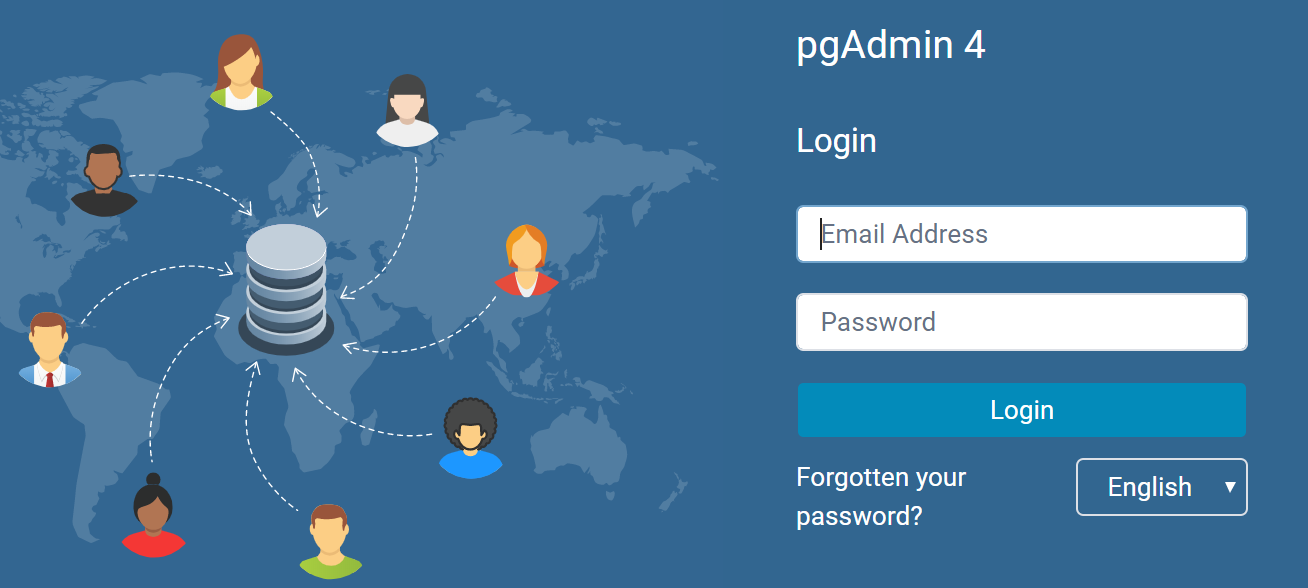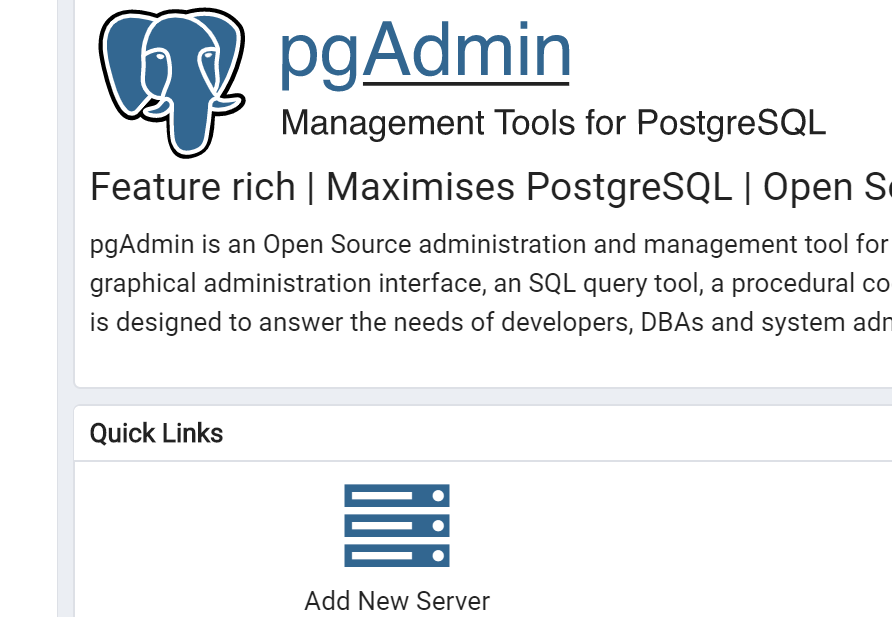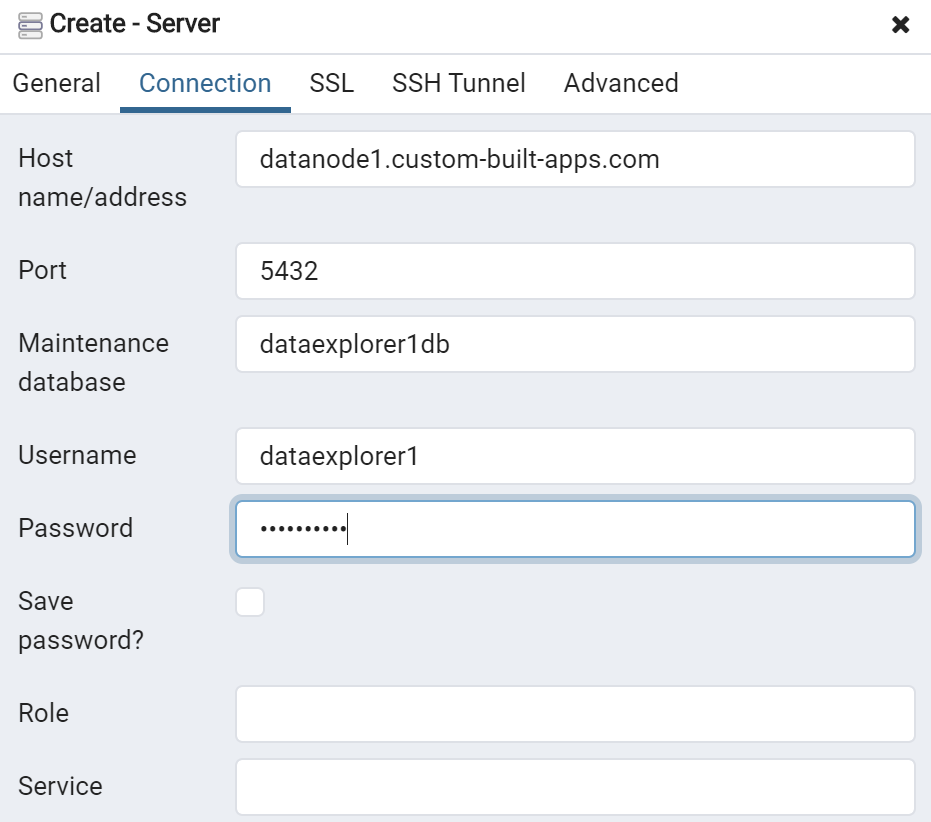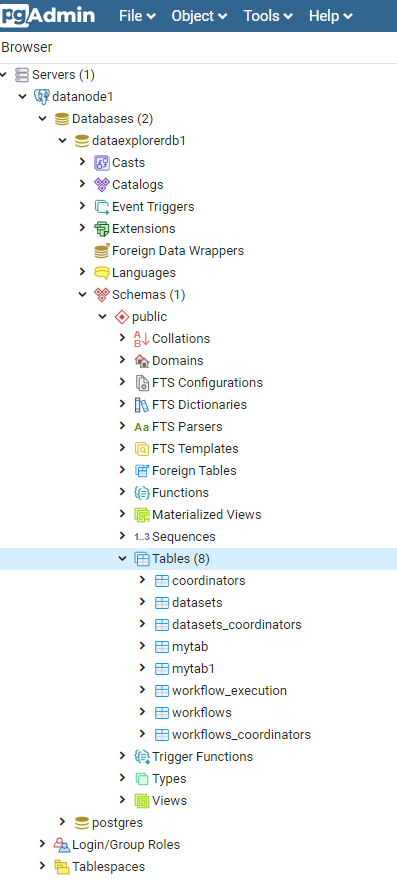Getting Slonik comfortable.
Installation
for Centos 7 the installation is straightforward with yum:
1, Get the repository:
yum install https://download.postgresql.org/pub/repos/yum/reporpms/EL-7-x86_64/pgdg-redhat-repo-latest.noarch.rpm
2. install client libraries:
yum install postgresql10
3.Install the server:
yum install postgresql10-server
If the yum install is not possible(in case of RHEL7) then go to
https://yum.postgresql.org/rpmchart.php
Download the following packages:
- postgresql10-libs-10.12-1PGDG.rhel7.x86_64.rpm
- postgresql10-10.12-1PGDG.rhel7.x86_64.rpm
- postgresql10-server-10.12-1PGDG.rhel7.x86_64.rpm
there is a standard way with obtaining the postgres repos, but it does not work right out of the box.
obtain the package:
pgdg-redhat-repo-42.0-9.noarch - this package installs postgreSQL repos
when you start the install
yum install pgadmin4
Error:
https://download.postgresql.org/pub/repos/yum/common/redhat/rhel-%24releasever-x86_64/repodata/repomd.xml: [Errno 14] HTTPS Error 404 - Not Found
Note the releasever variable did not get substituted with value.
Workaround:
go to /etc/yum.repos.d and update the file pgdg-redhat-all.repo as follows for version 10 of postgreSQL.
#######################################################
# PGDG Red Hat Enterprise Linux / CentOS repositories #
#######################################################
# PGDG Red Hat Enterprise Linux / CentOS stable common repository for all PostgreSQL versions
[pgdg-common]
name=PostgreSQL common for RHEL/CentOS $releasever - $basearch
baseurl=https://download.postgresql.org/pub/repos/yum/common/redhat/rhel-7-x86_64
enabled=1
gpgcheck=1
gpgkey=file:///etc/pki/rpm-gpg/RPM-GPG-KEY-PGDG
# PGDG Red Hat Enterprise Linux / CentOS stable repositories:
[pgdg10]
name=PostgreSQL 10 for RHEL/CentOS $releasever - $basearch
baseurl=https://download.postgresql.org/pub/repos/yum/10/redhat/rhel-7-x86_64
enabled=1
gpgcheck=1
gpgkey=file:///etc/pki/rpm-gpg/RPM-GPG-KEY-PGDG
install using yum install or rpm -i
- yum install postgresql10-libs-10.12-1PGDG.rhel7.x86_64.rpm
- yum install postgresql10-10.12-1PGDG.rhel7.x86_64.rpm
- yum install postgresql10-server-10.12-1PGDG.rhel7.x86_64.rpm
Configure and start
////////////////// INITIALIZE database after installation //////////////
Initialize database:
/usr/pgsql-10/bin/postgresql-10-setup initdb
Starting postgresql
Starting postgresql service
systemctl start postgresql-10
make the service enabled during the system restart
systemctl enable postgresql-10
starting postgresql not as service
export PGDATA=/var/lib/pgsql/10/data
pg_ctl start
change the password of the postrgress user:
passwd postgres
connect as postgres
su - postgres
Connect to the template1 database and change admin password:
psql -d template1 -c "ALTER USER postgres WITH PASSWORD 'tHePAsswOrD';"
open the psql interface:
psql
create a new user:
create role dataexplorer1 with login password 'sOmePasWD' valid until 'infinity';
create a database for the user:
create database dataexplorerdb1 with encoding='UTF8' owner=dataexplorer1 connection limit=-1;
grant all privileges:
grant all privileges on database dataexplorerdb1 to dataexplorer1;
show the hba_file location:
show hba_file;
/var/lib/pgsql/10/data/pg_hba.conf
close psql:
\q
Edit the pg_hba.conf file changing peer to trust
vi /var/lib/pgsql/10/data/pg_hba.conf
add the line:
host all all 192.168.2.0/24 trust
edit the postgresql.conf
file
listen_addresses = '192.168.2.23' # what IP address(es) to listen on;
port = 5432
if listening on all interfaces is OK then:
listen_addresses = '*'
connect remotely:
psql -U dataexplorer1 -h 192.168.2.23 dataexplorerdb1
List databases:
\l
create table, populate and query:
dataexplorerdb1=> create table mytab1(id int);
CREATE TABLE
dataexplorerdb1=> insert into mytab1 values(23);
INSERT 0 1
dataexplorerdb1=> select * from mytab1;
id
----
23
(1 row)
creating schemas
the same database can be used by the different users. This may bring about the naming conflicts, e.g. several repositories can be created in the same database for different users.
this is addressed by creating a schema for a user and letting them have all the tables in the namespace of their own.
update the postgresql.conf and restart the server
search_path = '"$user",public'
psql:
postgres=# show search_path;
search_path
----------------
"$user",public
\c cbaworkflowdb
create schema dataexplorer1;
grant all on schema dataexplorer1 to dataexplorer1;
alter user dataexplorer1 set search_path="dataexplorer1";
create schema dataexplorer2;
grant all on schema dataexplorer2 to dataexplorer2;
alter user dataexplorer2 set search_path="dataexplorer2";
After the changes above the database cbaworkflowdb has 3 schemas: public,dataexplorer1 and dataexplorer2.
When the user dataexplorer1 creates a table with non fully qualified name it will be created in dataexplorer1 schema.
pgadmin4 installation
Optionally install pgadmin4 on the server, but this will require the workaround above, as the package is hard to find for download
The pgadmin4 can be alternatively installed on a Windows box using installer from postgresql download. Otherwise continue:
yum install pgadmin4
Configure pgadmin:
cd /etc/httpd/conf.d
cp pgadmin4.conf.sample pgadmin4.conf
vi pgadmin.conf
LoadModule wsgi_module modules/pgadmin4-python3-mod_wsgi.so
WSGIDaemonProcess pgadmin processes=1 threads=25
WSGIScriptAlias /pgadmin4 /usr/lib/python3.6/site-packages/pgadmin4-web/pgAdmin4.wsgi
<Directory /usr/lib/python3.6/site-packages/pgadmin4-web/>
WSGIProcessGroup pgadmin
WSGIApplicationGroup %{GLOBAL}
<IfModule mod_authz_core.c>
# Apache 2.4
Require all granted
</IfModule>
<IfModule !mod_authz_core.c>
# Apache 2.2
Order Deny,Allow
Deny from All
Allow from 127.0.0.1
Allow from ::1
</IfModule>
</Directory>
Note the usage of Python 3.6
Create the directories:
mkdir /var/lib/pgadmin4/
mkdir - /var/lib/pgadmin4/sessions
mkdir -p /var/lib/pgadmin4/storage
chown -R apache:apache /var/lib/pgadmin4
mkdir -p /var/log/pgadmin4/
chown -R apache:apache /var/log/pgadmin4
Update the config_distro.py:
vi /usr/lib/python3.6/site-packages/pgadmin4-web/config_distro.py
HELP_PATH = '/usr/share/doc/pgadmin4-docs/en_US/html'
UPGRADE_CHECK_ENABLED = False
LOG_FILE = '/var/log/pgadmin4/pgadmin4.log'
SQLITE_PATH = '/var/lib/pgadmin4/pgadmin4.db'
SESSION_DB_PATH = '/var/lib/pgadmin4/sessions'
STORAGE_DIR = '/var/lib/pgadmin4/storage'
Create the user account:
python3 /usr/lib/python3.6/site-packages/pgadmin4-web/setup.py
Enter email and password, record it on a piece of paper
Start the Apache server:
systemctl restart httpd
in the browser go to http://datanode1.custom-built-apps.com/pgadmin4
Enter the email and password you generated with setup.py
Add a server:
Add connection information:
After the connection is established you will see something like this:
Installing ODBC Driver
yum install postgresql10-odbc
rpm -qi postgresql10-odbc.x86_64
Name : postgresql10-odbc
Version : 12.01.0000
Release : 1PGDG.rhel7
Architecture: x86_64
Install Date: Fri 01 May 2020 01:04:48 AM EDT
Group : Unspecified
Size : 1060881
License : LGPLv2
Signature : DSA/SHA1, Mon 27 Jan 2020 03:15:31 AM EST, Key ID 1f16d2e1442df0f8
Source RPM : postgresql10-odbc-12.01.0000-1PGDG.rhel7.src.rpm
Build Date : Mon 27 Jan 2020 03:14:22 AM EST
Build Host : koji-centos7-x86-64-pgbuild
Relocations : (not relocatable)
Vendor : PostgreSQL Global Development Group
URL : https://odbc.postgresql.org/
Summary : PostgreSQL ODBC driver
Description :
This package includes the driver needed for applications to access a
PostgreSQL system via ODBC (Open Database Connectivity).
rpm -ql postgresql10-odbc.x86_64
/usr/pgsql-10/lib/psqlodbc.so
/usr/pgsql-10/lib/psqlodbca.so
/usr/pgsql-10/lib/psqlodbcw.so
/usr/share/doc/postgresql10-odbc-12.01.0000
/usr/share/doc/postgresql10-odbc-12.01.0000/readme.txt
/usr/share/licenses/postgresql10-odbc-12.01.0000
/usr/share/licenses/postgresql10-odbc-12.01.0000/license.txt
[root@r01edge etc]# ldd -r /usr/pgsql-10/lib/psqlodbc.so
vi /etc/odbc.ini
[ODBC Data Sources]
Test = PostgreSQL Test
[Test]
Driver=/usr/pgsql-10/lib/psqlodbc.so
Description=Sample PostgreSQL DSN
DSN=Test
Servername=192.168.2.23
Username=dataexplorer1
Database=dataexplorerdb1
ReadOnly=No
Servertype=postgres
Port=5432
FetchBufferSize=99
ServerOptions=
ConnectOptions=
Options=
ReadOnly=no
Trace=1
TraceFile=/etc/odbc.trace
Debug=1
DebugFile=/etc/odbc.debug
CommLog=1
[Default]
Driver=/usr/pgsql-10/lib/psqlodbc.so
[ODBC]
InstallDir = /usr/lib64/libodbc.so
vi my.sql
select * from mytab
isql Test dataexplorer1 myPaSsWoRd -v <my.sql
+---------------------------------------+
| Connected! |
| |
| sql-statement |
| help [tablename] |
| quit |
| |
+---------------------------------------+
SQL> select * from mytab
+------------+------------------------+
| id | product |
+------------+------------------------+
| 234 | Some value |
+------------+------------------------+
SQLRowCount returns 1
1 rows fetched
Install development libraries and headers for C
yum install postgresql10-devel
yum install postgresql-devel
the latest one for libpq-fe.h
Install development libraries and headers for C++
wget http://pqxx.org/download/software/libpqxx/libpqxx-4.0.tar.gz
tar xvzf libpqxx-4.0.tar.gz
export PATH=/usr/pgsql-10/bin:${PATH}
export LD_LIBRARY_PATH=/usr/pgsql-10/lib:{LD_LIBRARY_PATH}
cd libpqxx
./configure
make
make install




